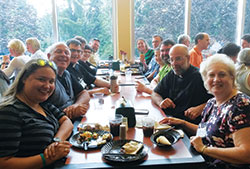Evangelization and Catechesis Supplement
Priests gain insight on ministry of catechesis during conference

Several parish catechetical leaders from across central and southern Indiana share a meal together during the St. John Bosco Conference held on July 17-20 at Franciscan University of Steubenville in Steubenville, Ohio. Included among them were three priests serving in the archdiocese. (Submitted photo)
By Sean Gallagher
The St. John Bosco Conference held each summer at Franciscan University of Steubenville in Steubenville, Ohio, draws hundreds of catechetical leaders from across the country and around the world.
It is a time for them to be renewed in their mission of forming people in the faith in the various settings in which they minister—parishes, schools and college campuses—and among people of all ages.
Most of those who attend the conference are lay Catholics since they have largely assumed leadership in this field of ministry in the decades since the Second Vatican Council.
Parish priests still have a role to play in catechesis, though, often through preaching, in various occasions of ministering to Catholics, and in encouraging the ministry and formation of lay catechetical leaders in their faith communities.
Three priests serving in archdiocesan parishes attended this year’s St. John Bosco Conference on July 17-20 in order to carry out more effectively the catechetical aspects of their priestly life and ministry, and to collaborate better with lay Catholics involved in this field.
Father Thomas Schliessmann, pastor of St. Lawrence Parish in Indianapolis, attended for the first time this summer.
“Our job [as priests] is to elicit an encounter with Christ,” he said. “Catechesis is one of those overlapping things that we all do. If we’re going to introduce Christ to people, there’s going to be some catechesis. There’s going to be some apologetics. There’s going to be some witnessing. There’s going to be some encouragement to discipleship, to follow him.”
Attending the conference helped Father Schliessmann evaluate how he can give himself more directly to catechetical ministry in the midst of his many administrative duties in leading a large faith community.
“A priest in a parish is always going to be involved in nuts and bolts stuff,” he said. “Quite a bit of that is going to take up a significant amount of his time. How does he make sure that he spends enough time on these other issues?”
Father Todd Goodson leads St. Monica Parish in Indianapolis, one of the largest faith communities in central and southern Indiana with more than 3,300 households.
He, too, wishes he could spend more time in helping people come to know Christ and learn more about the faith, that which he was trained to do in his years in priestly formation in seminary.
“Ideally, every evening I would be doing some kind of catechesis,” Father Goodson said. “But it’s hard to get to that.”
But he knows there are many moments in which he ministers to Catholics in which evangelization and catechesis can play a role.
“When I’m anointing somebody, first of all, I’m praying with them,” Father Goodson said. “I’m not teaching them. I’m praying with them for God’s healing, and that they might be comforted. From that then flows a deeper understanding of the faith.”
He appreciated how the conference emphasized helping Catholics first to develop a relationship with Christ and to have the knowledge of the faith grow from that.
“There are a lot of people who are going through the motions of coming into the Church, but they’re not really encountering Christ and having a relationship with him,” Father Goodson said. “In order to do catechesis, we first have to help people to have a relationship with Christ. From that then flows catechesis instead of just religious education.”
The conference offers its participants various tracks of workshops depending on their particular interest or field of ministry.
Father Goodson chose the youth ministry track.
“Youth ministry is a little bit of a struggle in this day and age,” he said. “They offered a lot of good assessment of youth ministry as a whole: what had been working in the past and may not be working now, and a good projection forward.”
Another challenge in catechetical ministry facing the Church in America today is how to pass on the faith in parishes made up of people from a variety of cultural backgrounds.
Father Juan Valdes, administrator of St. Anthony Parish in Indianapolis, experiences that in his faith community. It has many members whose families immigrated to Indianapolis a century or more ago, and many Latino parishioners who immigrated more recently from Mexico and several other countries in Central and South America.
Father Valdes himself was ordained for the Archdiocese of Guadalajara, Mexico, ministering there for 15 years before serving in central and southern Indiana for the last 11 years.
Attending this year’s conference gave Father Valdes a good perspective on the challenges in passing on the faith to Catholics from several ethnicities.
“You have to have knowledge, understanding, respect and inclusiveness,” he said. “You have to learn to work together. Those are the basics to work with different cultures.”
From his experience, though, Father Valdes knows there is a lot of work in catechizing the people to whom he ministers.
“You can’t presume anything,” he said. “You’ve got to start from the bottom and catechize children and parents in the basics, because even though you are a Catholic, you forget the faith.”
This year’s conference was the second that he attended, and he would like to attend future ones.
“The priest has to be a catechist, because catechesis is education in the faith,” Father Valdes said. “There is catechesis for children, young people and adults. You can be a catechist everywhere. These conferences help us to be catechists.” †
